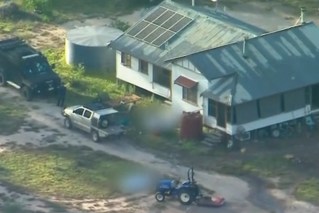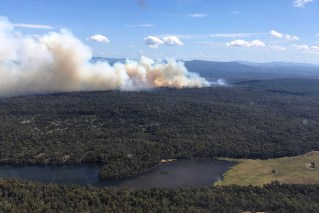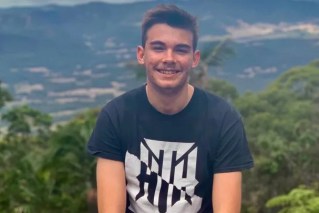Fears of Victorian outbreak ‘acceleration’ amid rise in intensive care admissions

Victoria’s chief medical officer has warned more people may die from the coronavirus amid an alarming “acceleration” in infections, increasing five-fold in just two weeks.
As Victoria recorded 77 new cases on Thursday, there were 20 people in hospital and four people in intensive care.
The state’s outbreak has also been linked to the Northern Territory’s first virus infection in three months while it was revealed two Victorians had travelled to Sydney while sick, sparking a crackdown on border crossings.
The NT case was a man who returned to Australia from Pakistan who may have contracted the virus during a brief stay in one of Melbourne’s hotspots.
Victoria’s chief health officer Brett Sutton said it was not unexpected that hospital admission rates were on the rise as outbreaks spread through suburban Melbourne hotspots.
“When you’ve got significant community transmission, when you’ve got 70-odd cases every day, there is absolutely a possibility, an expectation, that some of those people will die,” he said.

An outdoor testing site checks locals at a Melbourne shopping precinct. Photo: Getty
UNSW epidemiologist Mary-Louise McLaws, who sits on the World Health Organisation Experts Advisory Panel, told the ABC the numbers were moving in a concerning direction.
“I’ve been looking at the pattern for the last 14 days and the rolling 14-day average and it’s really gained an acceleration, particularly over the last week,” she said.
“So this increase [in Victoria] of 77, sadly isn’t a surprise because if you’re watching the pattern of this 14-day average, it’s about a 5-fold increase since the last 14-day average.
“When it gets this speed, it’s very hard to put it back to where it was before.”

Police perform lockdown checks at Broadmeadows in Melbourne. Photo: AAP
The warnings come as more than 300,000 residents in 10 Melbourne postcodes have been forced back into lockdown until July 29.
An inquiry has also been ordered into the state’s hotel quarantine program after it was revealed a large proportion of the recent outbreak was linked to security staff breaching infection control.
Headed by Justice Jennifer Coate, the inquiry will probe claims of widespread problems with the quarantine program, which is now on hold for a fortnight.
There are allegations of under-trained staff, inadequate personal protective equipment, billing rorts by private security contractors and even claims that some hotel guards slept with guests.
“It is abundantly clear that what has gone on here is completely unacceptable and we need to know exactly what has happened,” Premier Daniel Andrews said.
Justice Coate will look into allegations that infection control protocols were breached at the quarantine hotels.
The inquiry will probe decisions and actions by the government, hotel operators and private contractors, as well as the training of staff.
Australian virus treatment
A potential COVID-19 treatment which could stop healthy people being infected and speed-up sick patients’ recovery has been found in a Melbourne lab.
Affinity Biosciences have produced antibodies which can block the virus from infecting new cells and spreading throughout the body.
The antibodies work by binding tightly to the spike protein on the virus, preventing it from attaching itself to and penetrating healthy human cells.

Antibodies prevent the virus’ spikes from attaching to healthy human cells. Photo: Getty
“A lot of antibodies do that but these have a very high affinity, bind very tightly and smother the virus,” Affinity chief executive Peter Smith said.
In healthy patients, the antibodies would prevent the virus gaining a foothold while very sick patients could find themselves healing much faster.
Numerous groups have been chasing antibody-based therapies but the Australian biotechnology firm believes theirs is among the strongest so far.
“What we believe is these are as potent as any we’ve seen out there,” Dr Smith told AAP.
Testing conducted by the Peter Doherty Institute for Infection and Immunity in April found Affinity’s antibodies blocked the virus 100 per cent by the time the virus just started infecting cells, at around five days.
The company plans to produce the treatment in Australia, guaranteeing first-access for local patients.
The antibodies are currently in a comparative study being conducted by the La Jolla Institute for Allergy and Immunology in California, funded in part by the Bill and Melinda Gates Foundation.
Going through the motions
Researchers say sifting through sewage could help find coronavirus hotspots across the country.
Australian National University inspected Canberrans’ waste throughout May and didn’t find a single case of coronavirus.
Project leader Aparna Lal said that showed the tests were working because it was the same month the bush capital was declared free of the virus.
Dr Lal said sewage testing was a cheap and fast way for authorities to spot problems before they got out of hand.
“It would complement what patient-testing was already occurring,” Dr Lal said.
“Sewage is a really easy way to track the potential spread of the virus outside of (testing).”
Researchers could get results back in up to 48 hours and test for other viruses similar to coronavirus, like the flu.
Dr Lal said the tests showed little evidence of these types of viruses too, which she pinned on increased hygiene as a result of the pandemic.
Negative test is no Djok

Novac Djokovic came under fire for hosting a tennis tournament during a pandemic.
Men’s tennis No.1 Novak Djokovic has returned a negative coronavirus test after previously being infected.
The Serbian, who came under fire from Nick Kyrgios, became infected during the Adria Tour exhibition that he recently organised in Belgrade and Zadar.
The series was cancelled following an outbreak among players and coaches.
-with AAP





